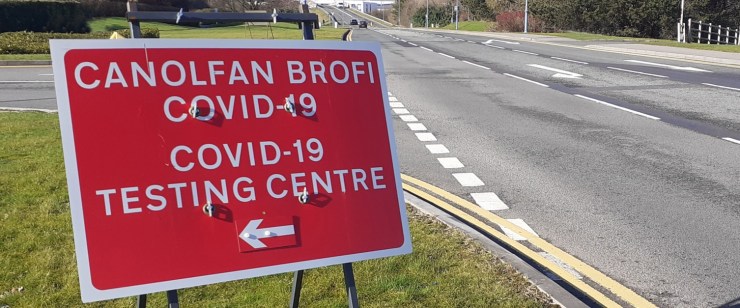Coronavirus
COVID-19 tests now being encouraged for people with a wider range of symptoms


Swansea Bay and Hywel Dda health boards are trialling new expanded testing criteria – with people suffering from a whole range of other symptoms being encouraged to get tested for COVID.
Previously, only those with either a high temperature, a new continuous cough, or a loss/change of taste and smell, were advised to seek a test.
Swansea Bay and Hywel Dda health boards are now also encouraging people to have a test if they have any of the following symptoms:
- Flu-like symptoms, including myalgia (muscle ache or pain); excessive tiredness; persistent headache; runny nose or blocked nose; persistent sneezing; sore throat and/or hoarseness, shortness of breath or wheezing
- Generally feeling unwell and a history of being in contact with a known COVID-19 case
- Any new or change in symptoms following a previous negative test
The change aims to find hidden COVID-19 cases in our communities and drive down the numbers of onward transmissions.
Identifying infections, which could otherwise go undetected, is particularly important as new variants of the virus emerge. The more tests carried out, the easier it will be to spot early clusters of cases and possible virus mutations. This will help with easing restrictions in the future.
The new testing regime will initially run for at least 28 days and will then be reviewed.
In Swansea Bay, a large new regional testing centre opening in Baglan, with the capacity to carry out 2,800 tests a day, means there is now plenty of capacity to test more people than ever before.
The new centre joins the regional testing centre at the Liberty Stadium and a number of mobile testing units across Swansea and Neath Port Talbot.
The smaller Margam testing unit, which was the first to open in the area 12 months ago, is changing its use to become a base for community testing staff.

Swansea Bay UHB Director of Public Health, Dr Keith Reid, said: “Demand for tests in Swansea and Neath Port Talbot has come down considerably since the end of 2020 so we have capacity to expand the offer of testing and help people confirm whether their illness is COVID.
“While the number of positive cases has come down, the rate has levelled off recently and is now showing signs of plateauing.
“This suggests the virus is still circulating at an unacceptably high rate in our communities, so we need to be both innovative and proactive in what we do next. This is especially important as schools re-open for onsite teaching.
“We are also aware of the risks posed by the COVID variants, and the need to identify them, if they are also circulating, as soon as possible.”
Alison Shakeshaft, Director of Therapies and Health Science at Hywel Dda University Health Board, said: “Overall, we are seeing a positive picture across the three counties and there has been a steady fall in the number of COVID-19 cases.
“Also, the demand for tests has come down considerably since the end of 2020, so we have capacity to expand the offer of testing to those with a wider range of symptoms.
“We know the wider group of symptoms do occur in COVID-19 but are not reported as often as the ‘classic three’ symptoms. With the very low rates of flu circulating at the moment, it is more likely that wider flu-like symptoms are due to COVID-19.
“Our aim is to find as many COVID-19 cases as possible so we can prevent the virus being passed on to others. We want to do everything we can to help bring the pandemic to a close as fast as possible and help restrictions to be lifted.”
If you have any of the symptoms outlined above, please stay at home and get a test by booking online via the UK portal https://www.gov.uk/get-coronavirus-test or ringing 119.
As these are national contacts, you may automatically be asked about the ‘classic three’ symptoms. However, to book your test simply choose either one of these options: “You have been asked to take a test by your local council” or “You are part of a government pilot project”.
Once you have had your test, you must continue to self-isolate until you receive your result, which will usually be within 24 hours of the test. If your result is positive, you must self-isolate for 10 days from the date your symptoms started. You will also be contacted by the local Tracing Team.
If your result is negative, you can end your self-isolation, when you feel well enough to do so.
-

 Bridgend7 days ago
Bridgend7 days agoNew coach service launches between Swansea and Bristol airport
-

 First Cymru3 days ago
First Cymru3 days agoBus services across Swansea to get timetable changes to improve reliability
-

 Construction4 days ago
Construction4 days agoWork to start on 43 home development at former Port Talbot school
-

 Dyfed Powys Police7 days ago
Dyfed Powys Police7 days agoBody found in search for missing Daniel Jones
-

 Carmarthenshire3 days ago
Carmarthenshire3 days agoCarmarthenshire man set for 100 mile marathon charity challenge
-

 Carmarthen7 days ago
Carmarthen7 days agoCarmarthen to Aberystwyth route sees 65% growth in passengers after introduction of electric buses
-

 Rugby6 days ago
Rugby6 days agoScarlets great Jonathan Davies awarded testimonial year
-

 Swansea7 days ago
Swansea7 days agoEnd of summer target for Princess Way scaffolding removal





























